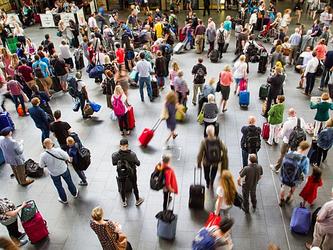Christianity declines to less than 50% of the population, census finds

The census, which released its ethnicity, national identity, language and religion results yesterday, found that 46.2% of the population described themselves as Christian, the lowest response in its history and a 13.1 percentage point decrease from 2011.
‘No religion’ was the second highest response at 37.2% of the country, up 12 points from 2011.
Wales had a greater decrease in people reporting their religion as Christian, with a 14-percentage point decrease from 57.6% in 2011 to 43.6% in 2021, and an increase in ‘no religion’ from 32.1% in 2011 to 46.5% in 2021.
Other major religions seen in the census was Muslim ( 6.5%) and Hindu ( 1.7%), both of which rose from 4.9% and 1.5% in 2011 respectively.
London was the most religiously diverse part of the country, with more than a quarter of residents reporting a religion other than Christian, while the northeast and southwest were the least religiously diverse, at 4.2% and 3.2% choosing other religions.
In total, 94% of respondents chose to answer the optional question on religion in the census.
Other findings in the census included that in 2021, 81.7% of usual residents in England and Wales described themselves as ‘white’, down from 86% in 2011.
‘Asian, Asian British or Asian Welsh’ was the next most popular ethnic group at 9.3% of the population, up from 7.5% in 2011.
The largest percentage-point increase was in the ‘other white’ category, which was up from 4.4% of the population in 2011 to 6.2% in 2021.
The proportion of the population describing themselves as ‘black’ rose from 1.8% in 2011 to 2.5% in 2021.
‘Any other ethnic group’ accounted for 1.6% of the population, while 10.1% of households consisted of members identifying with two or more different ethnic groups.
The census found that 90.3% of the population identified with at least one UK national identity, including British, English, Welsh, Scottish, Northern Irish or Cornish.
People who said they had both British and non-British identities accounted for 2% of the overall population, while 9.7% had a non-UK national identity, up from 8% in 2011.
Polish was the largest non-UK national identity with 593,000 people or 1% of the population, followed by Romanian ( 477,000 ), Indian ( 380,000 ), Irish ( 300,000 ) and Italian ( 287,000 ).
English was the main language of 91.1% of usual residents, aged three years and over, while a further 7.1 were proficient in English but did not speak it as their main language.
The most common main languages, other than English, were Polish ( 1.1%), Romanian ( 0.8%), Panjabi ( 0.5%), and Urdu ( 0.5%).
Scotland and Northern Ireland carried out separate censuses in 2022 and 2021 respectively.

We hope you enjoyed this article.
Research Live is published by MRS.
The Market Research Society (MRS) exists to promote and protect the research sector, showcasing how research delivers impact for businesses and government.
Members of MRS enjoy many benefits including tailoured policy guidance, discounts on training and conferences, and access to member-only content.
For example, there's an archive of winning case studies from over a decade of MRS Awards.
Find out more about the benefits of joining MRS here.














0 Comments